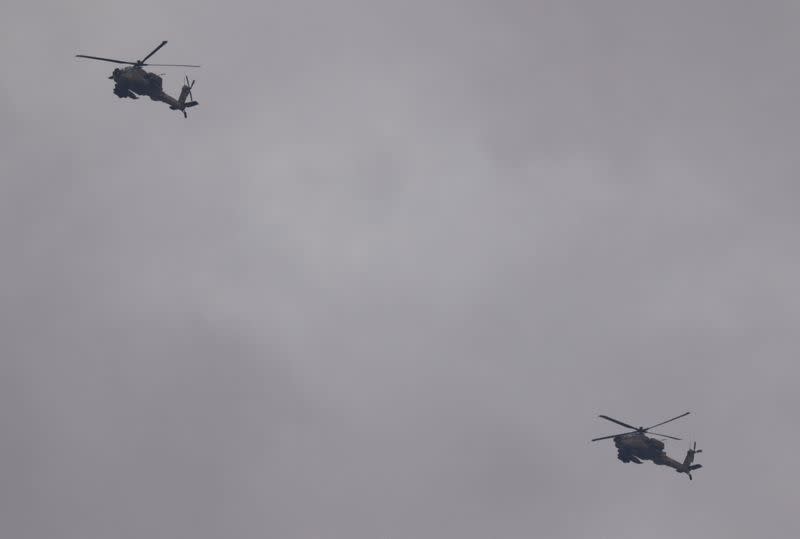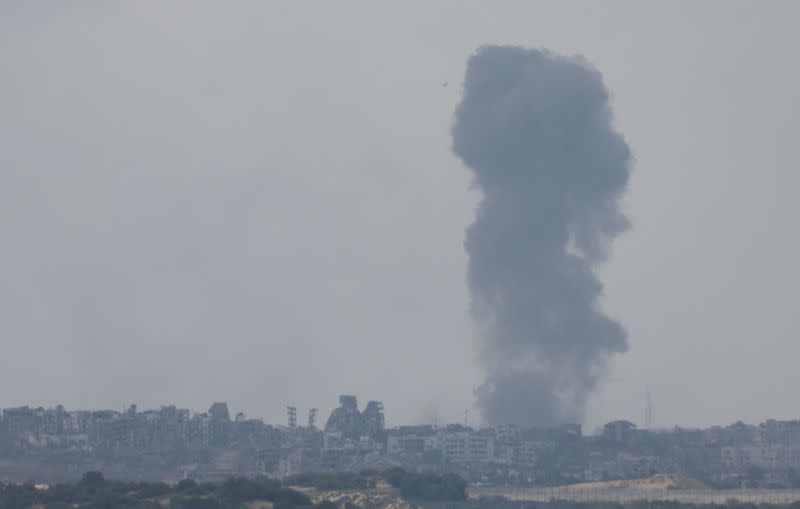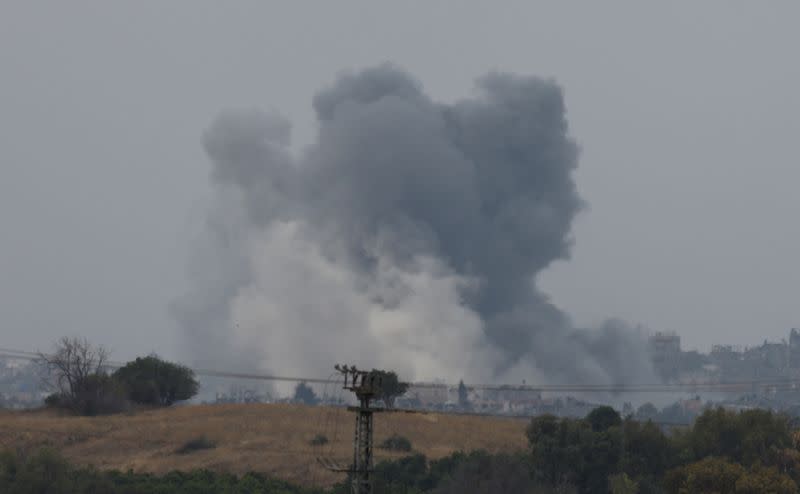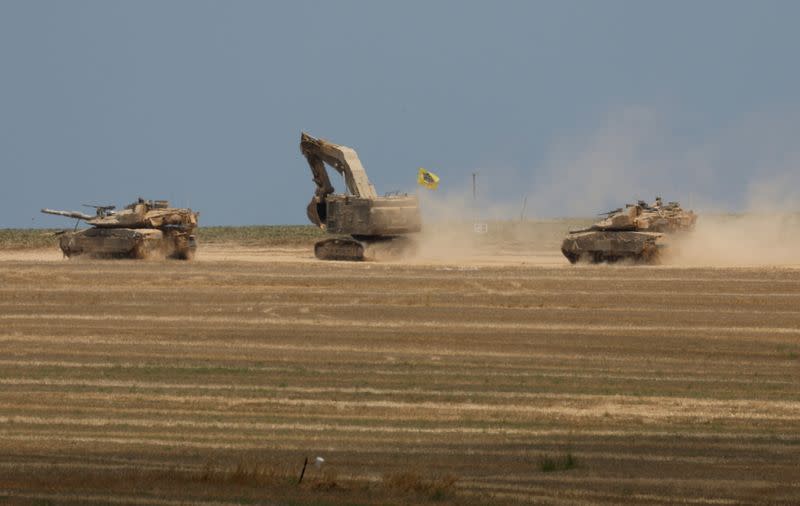Israeli forces back in old Gaza battlegrounds as doubts over war aims grow
- Oops!Something went wrong.Please try again later.
- Oops!Something went wrong.Please try again later.
By James Mackenzie and Nidal al-Mughrabi
JERUSALEM/CAIRO (Reuters) - Seven months into the war, Israeli troops are back fighting in the north of the Gaza Strip, in areas that were supposed to have been cleared months ago, highlighting growing questions about the government's declared goal of eliminating Hamas.
As tanks have started pushing into the southern city of Rafah, where the military says the last four intact battalions of Hamas are dug in, there has been fierce fighting in the Zeitoun area of Gaza City and around Jabalia, to the north, both of which the army took control of last year before moving on.
The renewed fighting there - amid international pressure for a ceasefire - has underscored concern in Israel that the lack of a clear strategic plan for Gaza will leave Hamas in effective control of the enclave it has ruled since 2007.
As Israel marks one of its most sombre Independence Days on Tuesday, a clear end to the war appears as far off as ever.
Hunkered in the extensive tunnel network that runs beneath the ruins of Gaza, Hamas appears to retain broad support among a population scarred by a campaign that has killed more than 35,000 Palestinians and forced most Gazans from their homes.
"If we rely on a strategy of ongoing attrition or surgical operations against Hamas, it won't achieve the goal of governmental or military collapse," said Michael Milshtein, a former military intelligence officer and one of Israel's most prominent experts on the Islamist movement.
U.S. Deputy Secretary of State Kurt Campbell declared on Monday that Washington doubted Israel would achieve "sweeping victory on the battlefield".
HARD-RIGHT ALLIES
For the past few weeks, cabinet officials have urged Netanyahu to formulate a clear "day after" policy for Gaza, according to two security officials.
However Netanyahu has so far insisted on total victory, responding to pressure from hard-right allies such as Security Minister Itamar Ben-Gvir and Finance Minister Bezalel Smotrich, whose support he needs to hold his ruling coalition together.
Despite international calls for a revival of efforts to find a solution to the decades-long conflict, talk of a political settlement has been rejected repeatedly by a government that refuses to contemplate any steps towards an independent Palestinian state.
That has left it forced to seek a purely military solution that has complicated the task of the troops on the ground.
This week, Israel's Channel 13 news reported that army commander Herzi Halevi had told Netanyahu that without a serious drive to build an alternative Palestinian government in Gaza, the military faced a "Sisyphean effort" to defeat Hamas - a reference to the character in Greek mythology condemned to endlessly push a boulder uphill.
Israeli officials have previously talked about drawing on local civil or clan leaders not associated with Hamas or the Palestinian Authority, which exercises a limited form of sovereignty in the West Bank, to provide an alternative.
Such efforts had proved fruitless, however, according to Milshtein. "Hamas is still the dominant power in Gaza, including in northern parts of the Strip," he said.
"WHAT COMES AFTER RAFAH?"
In contrast, the strategic goals of Yahya Sinwar, the Hamas leader in Gaza, appear clear - to survive the war in sufficient strength to rebuild, reflected in his insistence on a complete withdrawal of Israeli forces as a condition for any ceasefire deal.
"They are survival tactics for Hamas and soon Israel will find itself forced to answer the question, 'what comes after Rafah?'" said a Palestinian official not allied to Hamas who is close to stalled talks brokered by Egypt and Qatar.
How many fighters from Hamas and the other armed militant groups in Gaza have been killed remains unclear. Casualty figures published by Gaza's health ministry do not differentiate between civilians and combatants.
Netanyahu himself offered a figure of around 14,000 this week, which would be roughly half the total number of Hamas fighters the Israeli military estimated at the start of the war.
Hamas has said that Israeli estimates exaggerate the numbers of dead and in any case the fighters have adapted their tactics as their organised units have been broken down.
Despite heavy U.S. pressure not to launch an assault on Rafah, its population swollen by hundreds of thousands of displaced Palestinians, Israeli commanders have begun probing deeper into the city. It remains far from clear what they will face in its narrow streets if they launch a full-scale assault.
"Our fighters choose their battles, they don't allow the occupation to impose the battle time or ground for us because we don't have equal military capabilities," said a fighter from one of the armed factions.
"We don't have to clash face-to-face, but the occupiers and the invaders will lose soldiers and vehicles almost every day, here and there inside Gaza. They will never settle."
How far Israel is ready to go is unclear. Surveys continue to show broad support for the war among a population still traumatized by the Hamas-led attack on Oct. 7 that killed some 1,200 people and saw more than 250 taken into Gaza as hostages.
But weekly protests by the hostages' families over the failure to bring those still in captivity home have shown that such support is matched by anger at a government most Israelis blame for the security failures that preceded the attack.
Heckling of Netanyahu and some of his ministers at Monday's Memorial Day ceremonies for Israel's war dead show how unhappy the general mood in the country appears to be, said Yossi Mekelberg, an associate fellow with the Middle East and North Africa Programme at Chatham House in London.
"You see some representatives of the government coming to the cemeteries, and some of them, quite a few of them, are facing very angry families and others who blame them for what has happened in the last seven months," he said.
(Additional reporting by Andrew MacAskill in London; Editing by Alex Richardson)




